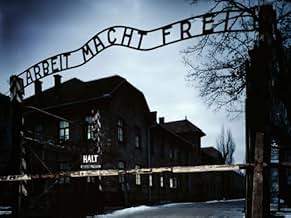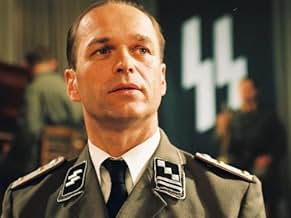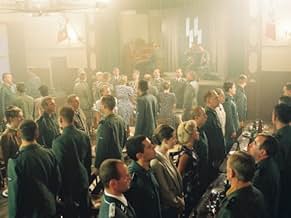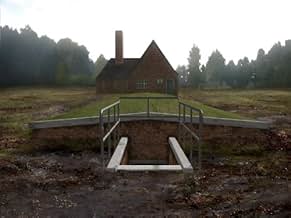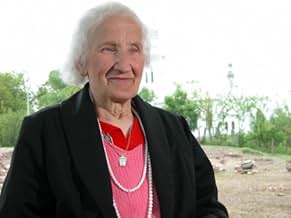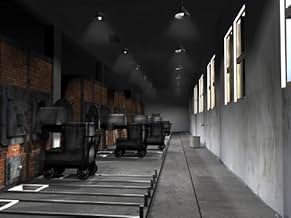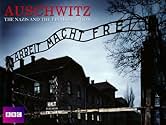IMDb-BEWERTUNG
8,6/10
4748
IHRE BEWERTUNG
Füge eine Handlung in deiner Sprache hinzuThe history of the Final Solution phase of the Nazi Holocaust, particularly with the most infamous of the death camps.The history of the Final Solution phase of the Nazi Holocaust, particularly with the most infamous of the death camps.The history of the Final Solution phase of the Nazi Holocaust, particularly with the most infamous of the death camps.
Folgen durchsuchen
Empfohlene Bewertungen
The documentary impressed me, it has a different approach from others that I have watched. It described a detailed physical and a social situations of the camp. In the end of each chapter, you can understand a little more deeply what it had represented for the Jewish people, the foreigners, the families, the Nazis, all the horror and the distorted ideas that make all these things happened. For the people who experienced it and all the political involved, all the consequences for all nations involved and the thoughts of "Nazi", in the final I was sad and I think the history have a power to educate ourselves to be a better person, not repeat the atrocities, the ideal to exterminated a race is outrageous, we are not God and we can't decide the their destiny.
People involved with the production of this documentary understand and achieve the maturity in which not many people attain. It is that the facts of the Holocaust need no over-dramatisation at all. A simplistic and even storytelling, plus fairness and calmness, is just right, if one wants real impact for the audience. This piece of excellent journalism establishes the evolutionary nature of a thinking mind: it grows on you. Watching this documentary is comparable to hearing a politely confident voice taking us down the road we do not plan to complete the journey. Just like death camps themselves, or the mind of the Jewish and other victims at the time, people in the field did not know what they were up against. Unfortunate circumstances, at first, had led to bad, worse, and finally hopeless situation for those violated and abused at the extreme. Some people lost their sense of optimism and logical thinking. Some people firmly believed that "God" had completely forgotten this Hell on earth, or simply found it too much of a Hell to visit. I think that the producers and directors of this documentary had wanted to walk us step by step, without attempting to let us presume anything. Personal judgment at the end, therefore, is genuine. I believe it is by way of honouring this dark saga of human tragedy most properly. it is too large an issue to be pre-cooked. It must be knowledgeably and decently presented to the audience, and let that audience figure out themselves. This documentary feature has accomplished that task. People who watch would have the memories with them for life. I grew up all my life in Asia. Far away from Hell of Auschwitz and other death camps a million miles apart. Yet, I feel the feeling. I feel the historical task to do whatever I can about it. Yes, I share.
TV often fails to convey complex information: both in facts and emotionally; instead it mostly serves up the obvious with images to trick our eyes.
This documentary sets a new standard: the research is impeccable, the interviews gripping, the production perfect in every respect and finally the horror, the terrible horror of what humans can do, is absolutely clear. A history book could not do a better job.
One of the best and bravest aspects of the series is when the interviewers ask a person how they felt about a murder they committed: did they regret it, how do they feel about it now? Those interactions make it worth watching the series alone.
This documentary sets a new standard: the research is impeccable, the interviews gripping, the production perfect in every respect and finally the horror, the terrible horror of what humans can do, is absolutely clear. A history book could not do a better job.
One of the best and bravest aspects of the series is when the interviewers ask a person how they felt about a murder they committed: did they regret it, how do they feel about it now? Those interactions make it worth watching the series alone.
2005 was a good year for the BBC. They had Rome, they resurrected the Doctor Who franchise - but before all that, they created Auschwitz - The Nazis and the "Final Solution", which was, without doubt, their best WWII show yet. This harrowing account of what life was like inside the Nazi death camp uses real life footage, powerful and realistic dramatization sequences, and interviews with people who were there to create one of the most powerful mini-series ever broadcast on television. It shows the horrors of Auschwitz and other death camps in Germany and Poland to a generation who have never been forced to endure it, and uses the latest computer trickery to show to you the atrocious conditions in which the Jews lived. This is more than just a mini-series - it is a masterpiece, and lets everybody know that we are not to let things like this ever happen again. From the first to the final episode, I watched it with amazement, learning more and more about what happened in Europe over 60 years ago, and thinking "Why?". It is not the sort of thing you should watch for enjoyment - you watch it to remember those who died at Auschwitz, and think about their struggles and fears, and hope that no race ever treats another people like that ever again.
If you can see this show, do see it, as it is a harrowing, powerful, and well-researched tribute to the six million people who died because of the immense cruelty of the Nazis. A must-see. 10/10
If you can see this show, do see it, as it is a harrowing, powerful, and well-researched tribute to the six million people who died because of the immense cruelty of the Nazis. A must-see. 10/10
I'm not a Jew so I have no axe to grind.
This is probably the most comprehensive account of the most infamous death-camp of them all. Not only are ex-inmates interviewed, but also ex-SS guards who are extraordinarily candid about their work & their attitude to the prisoners. The whole machinery involved in the organisation & efficiency of what amounted to an entire murder camp system.
This 6 part documentary cannot be ignored, once you have seen the evidence & heard the testimony there will be no doubt in your mind. It did happen & it was done by people not much different from the rest of us.
It cannot be allowed to happen again.
This is probably the most comprehensive account of the most infamous death-camp of them all. Not only are ex-inmates interviewed, but also ex-SS guards who are extraordinarily candid about their work & their attitude to the prisoners. The whole machinery involved in the organisation & efficiency of what amounted to an entire murder camp system.
This 6 part documentary cannot be ignored, once you have seen the evidence & heard the testimony there will be no doubt in your mind. It did happen & it was done by people not much different from the rest of us.
It cannot be allowed to happen again.
Wusstest du schon
- WissenswertesAlle Einträge enthalten Spoiler
- Alternative VersionenIn Spain, on January 29, 2005, a 104-minute cut was premiered on television. Hosted by the actress María Galiana, and with additional interviews to the Spanish survivors Jaume Álvarez, Enric Marcó and Neus Català. And co-produced by Sagrega TV, SA.
- VerbindungenFeatured in Ein Tag in Auschwitz (2020)
Top-Auswahl
Melde dich zum Bewerten an und greife auf die Watchlist für personalisierte Empfehlungen zu.
- How many seasons does Auschwitz: Inside the Nazi State have?Powered by Alexa
Details
- Erscheinungsdatum
- Herkunftsländer
- Offizieller Standort
- Sprache
- Auch bekannt als
- Auschwitz: Inside the Nazi State
- Drehorte
- Produktionsfirmen
- Weitere beteiligte Unternehmen bei IMDbPro anzeigen
- Laufzeit48 Minuten
- Farbe
- Sound-Mix
- Seitenverhältnis
- 1.78 : 1
Zu dieser Seite beitragen
Bearbeitung vorschlagen oder fehlenden Inhalt hinzufügen


